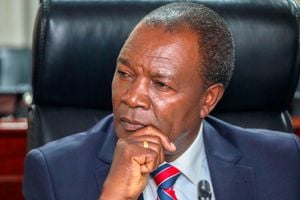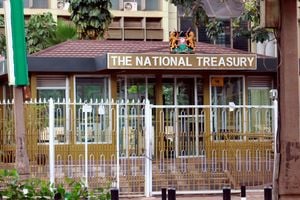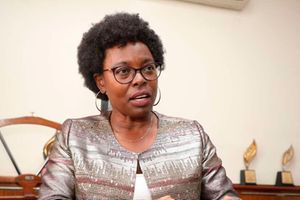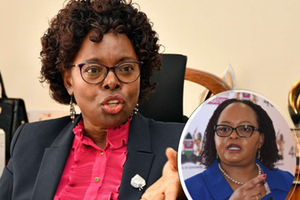Controller of Budget Margaret Nyakang’o and a map of the best and worst counties to do business with.
Kiambu, Nairobi, Narok and Kajiado are among the well-to-do counties that are spending the least to pay staggering pending bills owed to desperate suppliers who are in financial distress.
Kiambu County has paid only four per cent of verified pending bills that it owes to suppliers, making it by far the worst county in the country to supply with goods and services.
A report by the Controller of Budget (CoB) shows that by April 17, 2023, counties had settled Sh23.96 billion, or 49.78 per cent, of the Sh49.1 billion eligible pending bills.
Individuals and companies that did business with county governments and have never been paid have lamented they are hounded by creditors. Some have had their assets auctioned due to defaulted repayments, with many plunging into depression. In extreme cases, a few have died by suicide.
Map of Kenya showing the best and worst counties to do business with.
But the government has explained that the delays in payments are as a result of slow verification of pending bills to ensure fraudulent claims, such as those filed for no work done or deliveries made, or even inflated invoices, are not paid.
According to data from the National Treasury, Governor Kimani Wamatangi’s Kiambu had accumulated eligible pending bills amounting to Sh3.36 billion by April 2023 but had paid suppliers only Sh143.3 million.
This is despite the county being one of the largest recipients of equitable share of revenue from the national government each year. In the current financial year, which ends in June, the devolved unit has been allocated Sh12.22 billion.
Also Read:Ruto insiders bag mega contracts
Following closely is Governor Johnson Sakaja’s Nairobi, which has paid only nine per cent of verified pending bills. Nairobi has by far the largest share of eligible pending bills, which hit Sh10.6 billion in April last year.
But the county government has paid just Sh975.2 million, despite being allocated the highest amount of money by the national government. Nairobi has been allocated Sh20 billion in equitable revenue share this year, but its annual revenue is far higher once own-source earnings are factored in.
Narok County, which is led by Governor Patrick Ntutu and which has an allocation of Sh9.19 billion in the current year, has settled just 26 per cent of its verified pending bills. The county has eligible pending bills amounting to Sh911.8 million but has settled just Sh237.6 million.
Governor Joseph Ole Lenku’s Kajiado has a payment rate of 30 per cent, having paid Sh420 million of the Sh1.4 billion it owes private businesses. Other counties in the pending bills list of shame are Governor Kiarie Badilisha’s Nyandarua (39 per cent), Governor Benjamin Cheboi’s Baringo (42 per cent), Governor Erick Mutai’s Kericho (43 per cent), Governor Dhadho Godhana’s Tana River (48 per cent), Governor Joshua Irungu’s Laikipia (50 per cent) and Governor Mohammud Ali’s Marsabit (51 per cent).
On the other hand Nyeri, Siaya and Mandera counties have settled all their verified pending bills, making them the best devolved units for suppliers and contractors.
Governor Mohamed Khalif’s Mandera has paid all its eligible pending bills, which stood at Sh195.6 million, Governor James Orengo’s Siaya has settled verified arrears of Sh239.4 million it owed suppliers, while Nyeri led by Governor Mutahi Kahiga had eligible pending bills amounting to Sh477.3 million and settled it.

Controller of Budget Margaret Nyakang’o.
Also Read:The naked truth about state tenders
Other counties that have settled the largest share of their pending bills are Governor Irungu Kang’ata’s Murang’a (99.7 per cent), Governor Issa Timamy’s Lamu (99 per cent), Nyamira of Governor Amos Nyaribo (99 per cent), Governor Ochillo Ayacko’s Migori (96 per cent) and Governor Jonathan Leleliit’s Samburu (95 per cent).
What will, however, worry taxpayers is that counties were found to have accumulated Sh108.05 billion ineligible bills.
These bills include those that were not fully supported by the required documentation as well as instances where goods and services were either partially delivered or not delivered entirely.
Despite these, some counties went ahead to settle these questionable bills to a tune of Sh1.83 billion, a decision that has been questioned by the CoB, Dr Margaret Nyakang’o.
According to the National Treasury, Migori has paid the largest amount of ineligible pending bills. The county paid Sh490.54 million to suppliers for supply of goods and services which had not been verified.
It was closely followed by Samburu, which paid ineligible bills worth Sh485.1 million. Other counties that paid the highest amount of ineligible bills are Governor Mutula Kilonzo Junior’s Makueni (Sh258.8 million), Governor Joshua Irungu’s Laikipia (Sh137.2 million), Governor Cecily Mbarire’s Embu (Sh119.9 million), Lamu (Sh99.2 million), Kiambu (Sh56 million), Kakamega of Governor Fernandes Barasa (Sh9.8 million) and Murang’a (Sh8.2 million).
Pending bills have been a major headache for businesses that supply not only to counties but also to national government ministries, departments and agencies.
The non-payment for goods supplied or services rendered has driven some of these entrepreneurs into financial ruin, with some businesses having collapsed entirely.
The verification process of a good chunk of pending bills has also proved to be slow and tedious, making some businesses lose hope of ever recovering their money.
The Intergovernmental Budget and Economic Council (IBEC), through a resolution in June last year, instructed all county governments to finalise verification of ineligible pending bills.
IBEC is chaired by Deputy President Rigathi Gachagua.
“Once verified, county governments should prioritise payment of these arrears,” said the Treasury.












